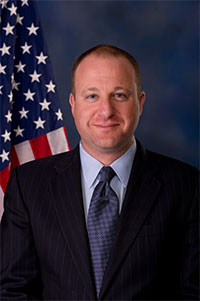Problems linger over religious exemptions to flagship civil rights legislation
This is a bad year gone worse for ENDA – the Employment Non-Discrimination Act. Even though it might pass the Democratic-controlled Senate, the bill will have no realistic chance of passing the Republican-controlled House. Now, on the same day ENDA was re-introduced to this session of Congress, the LGBT legal community has raised objections.
U.S. Rep. Jared Polis (D-Colo.) and Senator Jeff Merkley (D-Ore.) introduced ENDA to the 113th Congress on April 25.
That same day, four major LGBT legal groups issued a statement expressing “very grave concerns” about an exemption in ENDA that would give religious organizations “a blank check” to discriminate against LGBT people.
ENDA has been walked around the halls of Congress in one form or another for 39 years. Its early incarnation was to prohibit sexual orientation discrimination in a wide variety of arenas, including employment, housing, public accommodations. But since 1994, the bill has been limited to employment. It seeks to prohibit employers with 15 or more workers from discriminating against an employee or applicant because of the person’s sexual orientation or gender identity.
ENDA would give the courts, the Equal Employment Opportunity Commission, and the U.S. Attorney General the same power to enforce ENDA as they have under the Civil Rights Act of 1964.
Section 6 of ENDA includes a provision that would exempt an employer that is already exempt under the religious exemptions in Title VII of the Civil Rights Acts of 1964. Those sections exempt religious-oriented from the law when it comes to hiring people to perform work “connected” to carrying out the religious “activities” of that institution. They also exempt various educational institutions controlled “in whole or in substantial part…by a particular religion or by a particular religious” affiliate that is “directed toward the propagation of a particular religion.”
What troubles the LGBT legal groups — according to a statement released by Lambda Legal, National Center for Lesbian Rights, the ACLU, and the Transgender Law Center — is that Section 6 would provide exemptions “far beyond houses of worship” and enable hospitals and universities to discriminate against LGBT people.
“It gives a stamp of legitimacy to LGBT discrimination that our civil rights laws have never given to discrimination based on an individual’s race, sex, national origin, age, or disability,” said the statement. “This sweeping, unprecedented exemption undermines the core goal of ENDA by leaving too many jobs, and LGBT workers, outside the scope of its protections.”
But Section 6 in this year’s ENDA is the exact same language used in the bill in 2007, 2009, and 2011.
Why didn’t Lambda and others object before?
They did, said Greg Nevins, a spokesman for Lambda. But a lot of that discussion was lost in the dust-up around the inclusion of gender identity in 2007. That’s the year Rep. Barney Frank pushed for a vote on the bill in the House over the objections of most LGBT organizations because the bill lacked protection from gender identity discrimination. The non-inclusive ENDA passed the House by a vote of 235 to 184. A non-inclusive version came within one vote of passing the Senate in 1995.
Lambda issued a statement in October 2007 that was signed by NCLR, ACLU, and the Transgender Law Center, objecting to the omission of protections for transgender people. It also objected to language that left “gaping loopholes” in the definition of who is protected, and to a “blanket exemption for religious employers” that was “broader than the exemptions in other civil rights laws.”
While some sources said the groups working on ENDA mulled over three possible alternatives to the religious exemption this year and simply couldn’t agree on which to put forth, Nevins and others said “all” the groups were opposed the religious exemption, period.
“We were not talking about alternative language so much as deletion of what’s in there now,” said Nevins.
Why didn’t all groups sign onto the statement of objection?
Mara Keisling, executive director of the National Center for Transgender Equality who was actively involved in the ENDA construction, said none of the groups like the language. But, she said some groups “made a calculation several weeks ago.”
“Because the [bill’s] sponsors wanted it the way it was and because it’s not likely to be signed into law this Congressional session, there’s still an advantage to getting political movement on the bill this session and we wanted to have ENDA pushed ahead as far as possible.”
Transgender Equality “doesn’t like” the religious exemption, she said, “but, like every one of the groups working on ENDA, we decided we could live with it and come back to fix it in the next Congress.”
Ironically, one opponent of ENDA testified last year that the bill’s language would have a “chilling effect” on religious organizations. National Religious Broadcasters Association spokesman Craig Parshall said the language of the bill would prohibit a religious employer from firing an employee who did not share the organization’s religious tenets.
“No bill is perfect. ENDA isn’t perfect,” said Keisling. “But it’s better than last Congress and if it doesn’t become law this year, we’ll work to make it even better next Congress.”
According to the ACLU, only 16 states have laws to prohibit discrimination based on sexual orientation and gender identity.



“Religion poisons everything.”
Hear Hear!! Great job, no one should be forced to do anything if it infringes on your religion…look up the 1st amendment.